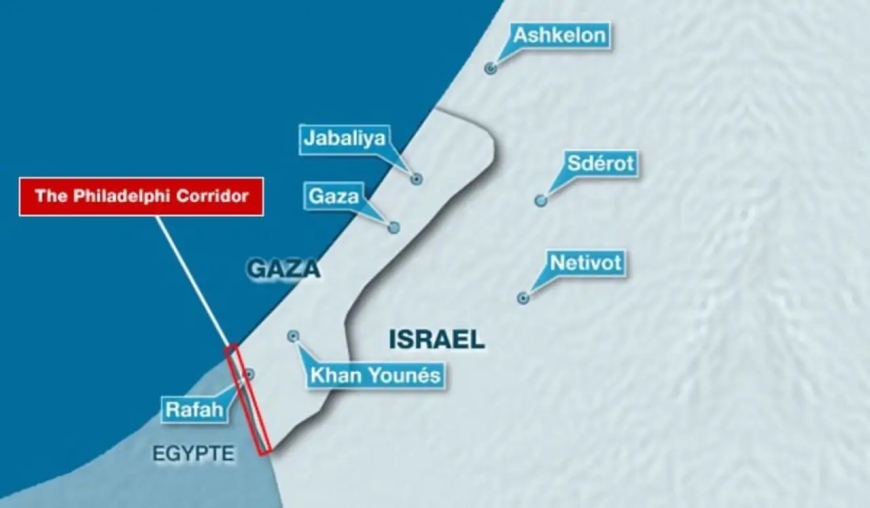Netanyahu’s Last Stand: How Netanyahu’s Obsession with the Philadelphia Corridor Doomed Israel's Future

Benjamin Netanyahu's latest maneuvering regarding the Philadelphia Corridor reeks of the desperate tactics of a man cornered, both politically and strategically. The Israeli Prime Minister’s fixation on maintaining a military presence in this obscure strip of land, a 14-kilometer-long passage at the southern edge of the Gaza Strip, is neither about ensuring Israeli security nor about some grand vision for peace. Rather, it is the desperate ploy of a leader whose house of cards is crumbling beneath him.
What, one might ask, is the Philadelphia Corridor, and why has it suddenly become the focal point of Israeli policy? This narrow corridor, marking the boundary between Gaza and Egypt, has historically been a nebulous zone—a gray area left unresolved since the Camp David Accords of 1978. Its strategic ambiguity allowed Israel to exercise an ill-defined control, all while tightening its chokehold on Gaza. After all, the withdrawal of Israeli settlers from Gaza in 2005, during the Sharon’s tenure “disengagement plan,” was never the benevolent act of peacemaking it was dressed up to be. The noose remained firmly in place, with Israel controlling Gaza’s air, sea, and land borders and tightening the siege year after year.
Now, in the wake of a devastating war that has left Gaza in ruins and Israel more isolated on the world stage, Netanyahu clings to the Philadelphia Corridor as if it were his lifeline. He has audaciously framed the presence of Israeli forces in this zone as essential to national security, calling it the “oxygen” for Hamas. But this is nothing more than a flimsy facade designed to mask his true intentions: survival.
Netanyahu is not a man seeking peace; he is a man seeking to save his own skin. His refusal to agree to a ceasefire or to negotiate the release of Israeli prisoners is not about safeguarding the Israeli populace. It is about safeguarding his political future. By maintaining the façade of military necessity, he deflects the mounting internal criticism, buying time and evading accountability.
Make no mistake—Netanyahu's position on the Philadelphia Corridor is not shared by Israel's military and security elite. Respected figures such as Major General Yitzhak Barik and former military leaders like Gadi Eisenkot and Benny Gantz have all condemned this strategy as one that plunges Israel into an unending war of attrition, with the looming specter of regional escalation. Even the Mossad, Shabak, and Ministry of Defense have distanced themselves from Netanyahu’s reckless intransigence.
But Netanyahu, ever the political animal, knows that abandoning the corridor could spell his political demise. His far-right allies, Smotrich and Ben-Gvir, have threatened to dissolve the coalition if any ceasefire or prisoner exchange is reached without a decisive military victory over Hamas. Losing their support would mean the collapse of his administration. For Netanyahu, the Philadelphia Corridor is not just a strategic piece of land; it is his last card in a high-stakes game of political survival.
Moreover, the October 7, 2023, operation by the Palestinian resistance exposed the catastrophic failures of Netanyahu’s administration, leaving him vulnerable to investigation and, potentially, political annihilation. Calls for accountability are growing louder, and Netanyahu knows full well that a ceasefire and a peace agreement would inevitably lead to inquiries into his administration’s gross mismanagement. The man who has built his career on portraying himself as Israel's protector now finds himself in the humiliating position of clinging to war as his only refuge from political obliteration.
In fact, the United States is reportedly preparing a ceasefire agreement, which would include the withdrawal of Israeli forces from densely populated areas near the Philadelphia Corridor. This proposal, while in its nascent stages, threatens to further isolate Netanyahu, who will undoubtedly scramble to fabricate new excuses to delay or sabotage any peace process that does not serve his interests.
How long will Netanyahu continue this charade? How many more lives will be lost to prop up his crumbling regime? The Philadelphia Corridor, once a neglected footnote in Israeli-Palestinian relations, has now become the stage upon which the tragic farce of Netanyahu’s political career unfolds. And as the world watches, one cannot help but wonder: when will the curtain finally fall?













































